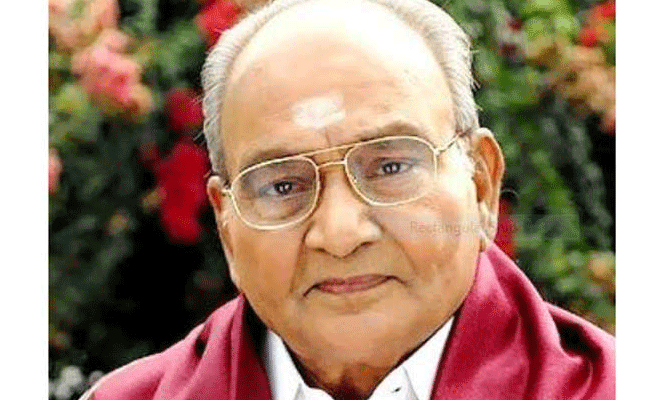Hyderabad (PTI): Dadasaheb Phalke awardee and renowned filmmaker Kasinadhuni Viswanath died at a private hospital here. He was 92.
Viswanath was unwell for some time and was suffering from age-related issues, sources said. He passed away at the hospital around midnight Thursday.
Popularly known as 'Kalatapasvi', Viswanath was born in February 1930 in Andhra Pradesh.
A prominent name, not just in Telugu cinema but also in Tamil and Hindi films, he became the 48th recipient of the Dadasaheb Phalke award, the highest recognition in Indian cinema. He was conferred with the award for the year 2016.
Telangana Chief Minister K Chandrasekhar Rao expressed his condolences over the death of Viswanath.
"Viswanath was a rare distinguished film director who chose ordinary story and turned it into a classic movie on the silver screen with his amazing talent," he was quoted as saying in a statement from the Chief Minister's Office said.
Andhra Pradesh Chief Minister Y S Jagan Mohan Reddy, in a tweet, expressed his grief over the death of the filmmaker.
"Vishwanath is a mirror of Telugu culture and Indian arts. Films under his direction have brought unparalleled respect to the Telugu film industry. He will remain forever in the hearts of Telugu people as an artist," Reddy said.
Former vice-president M Venkaiahn Naidu tweeted, "Deeply grieved to hear of the demise of renowned film director K Viswanath. As a filmmaker he brought depth and dignity to the medium, earning global recognition for his movies with a message. May his atma attain sadgati! Om shanti!."
Viswanath, who started his journey in the film industry as a sound artist, went on to direct award-winning films such as "Sankarabharanam", "Sagara Sangamam", "Swati Mutyam", "Saptapadi", "Kaamchor", "Sanjog" and "Jaag Utha Insaan".
His long career included an equally successful stint in front of the camera. He made 50 movies since 1965.
He debuted as a director with "Aatma Gowravam", which starred Akkineni Nageswara Rao and won the Nandi Award for the best feature film. He followed it with "Chelleli Kapuram", "O Seeta Katha", "Jeevana Jyoti" and "Sarada".
Venturing into mainstream acting, he worked in movies like "Swarabhishekam" (which he directed as well), "Pandurangadu", "Narasimha Naidu", "Lakshmi Narasimha" and "Seemasimham", "Kuruthipunal", "Kakkai Siraginilae" and "Bagavathi", among others.
Besides Dadasaheb Phalke Award, he was also felicitated with Padma Shri in 1992, five National Awards, 20 Nandi Awards (given by the Andhra Pradesh government) and 10 Filmfare trophies, including the Lifetime Achievement award.
"Shocked beyond words! K Viswanath's loss is an irreplaceable void to Indian/Telugu Cinema and for me personally! Man of numerous iconic, timeless films! The Legend Will Live on! Om Shanti !!," actor Chiranjeevi tweeted.
Several film industry personalities also paid their last respects to Viswanath.
Let the Truth be known. If you read VB and like VB, please be a VB Supporter and Help us deliver the Truth to one and all.
Hyderabad (PTI): Telangana Chief Minister A Revanth Reddy met Union Home Minister Amit Shah in Delhi on Wednesday night and urged him to increase the sanctioned strength of IPS officers to the state in view of its growing administrative and security needs.
The two leaders also discussed the recent surrender of several senior Maoist leaders before the Telangana Police and other issues.
"During the meeting, the two leaders discussed the issue of Maoist surrenders and their rehabilitation. The chief minister informed Shah that significant improvements in policing have taken place in Telangana over the past two years," an official release here said.
Highlighting that 591 Maoists have laid down their arms and joined the mainstream of society during this period, the chief minister said the state government was providing them compensation and rehabilitation assistance as per the rules.
He requested the Union home minister to extend financial support from the central government for development works in the backward regions of the state.
Reddy also urged Shah to increase the sanctioned strength of IPS officers to the state from 83 to 105 in line with the state's growing administrative and security needs, the statement said.
The first cadre review after the formation of Telangana was conducted in 2016, while the next review, due in 2021, was delayed and finally carried out in 2025. Even then, only seven additional IPS officers were allocated to the state, the chief minister informed Shah and requested that the third cadre review be conducted in 2026 as per the schedule.
Reddy explained that Telangana, like the rest of the country, is facing several modern challenges, including cybercrime, drug trafficking, white-collar crimes, and other emerging security threats.
He highlighted the reorganisation of the Hyderabad, Cyberabad, and Malkajgiri Police Commissionerates, the proposed formation of the Future City Commissionerate and the rapidly growing population in Hyderabad to underline the increasing administrative requirements of the state.





